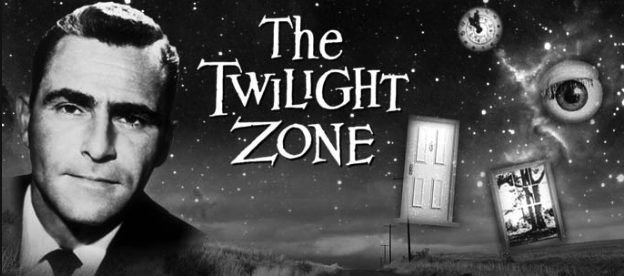I think it’s criminal that we are not permitted to make dramatic note of social evils that exist, of controversial themes as they are inherent in our society. I think it’s ridiculous that drama, which by its very nature should make a comment on those things which affect our daily lives, is in a position, at least in terms of television, of not being able to take that stand. —Rod Serling (1959)
Rod Serling, born Edwin Rodman Serling on December 25, 1924, would become one of America’s most important writers and producers of television dramas and screenplays primarily because of his vocal disapproval of censorship in the media. Before he began to seek new forms of media with minimal censorship, he was a successful writer for Playhouse 90, an American anthology drama. There, he wrote emmy-award winning scripts for “Patterns” (1955), a dramatization about corporate power, and “Requiem for a Heavyweight” (1956), which showed the struggles of a retired boxer in the aftermath of his 17-year career.1 However, it was Serling’s “A Town Has Turned to Dust” that would be his most controversial moment as part of the Playhouse 90 crew and would lead him into his next project as a writer. “A Town Has Turned to Dust” followed the story of Emmett Till, the young black boy brutally murdered in 1955 for allegedly whistling at a white woman in Mississippi. CBS decided to censor Serling’s script by making the black boy that was supposed to represent Till into a Mexican boy; they also made it seem as though it was the boy’s fault by depicting him as “getting out of line.”2 The network’s censorship removed many of the painful truths regarding the prejudices in America during this time. Serling would turn to the avenue of science fiction in order to escape this kind of censorship; in the words of Serling, “You know, you can put these words into the mouth of a Martian and get away with it.” Serling’s desire to get away from censored forms of media led to the creation of The Twilight Zone (1959-1964), a science fiction series that showcased people’s greatest fears ranging from alien invasion, death, ghosts, and even the effects of the Cold War on American society.3

Along with his criticism towards racial prejudice, Serling had his objections to the Cold War. The themes of the Cold War were largely absent from sitcoms and dramas during the 1950s; however, the episodes of The Twilight Zone, titled “The Shelter” (1961) and “Third from the Sun” (1960), discuss the effects of the Cold War head-on.4 In these two episodes, Serling brings forth the fears of the American people that were prevalent during the Cold War era (1945-1991) in terms of the overall anxiety and anticipation for a nuclear holocaust as well as the effects that the arms race had on the American psyche.
“Third from the Sun” deals more directly with the arms race and the creation of the hydrogen bomb. It was believed that the Americans were the only ones in possession of the atomic bomb; however, in 1949, the Soviets tested their first atomic bomb leading Truman to begin the quest for creating a more powerful bomb—the hydrogen bomb.5 Before the creation of this bomb, many people questioned the necessity of it. Would America win the arms race and would that be the end of it? Or would Russia create a hydrogen bomb as well? To address this question with our knowledge now, when the United States created the first hydrogen bomb in 1952, the Soviets followed suit with the creation of their first hydrogen bomb in 1955.6 Now, two nations were in possession of the world’s most powerful bomb. As Harold C. Urey stated, “Suppose that two countries have the hydrogen bomb…I would say that the probability that a war will start is increased if two groups each believe that they can win that war.”7 With the creation of the hydrogen bomb in both the U.S. and Russia, both countries were capable of obliterating the other. This is seen in “Third from the Sun” when Will Sturka, a scientist that works on hydrogen bomb production, learns from a suspicious coworker that the company planned on setting off a bomb in 48 hours. With this information, Sturka and his friend, Jerry Riden, a pilot of an experimental spacecraft, decided that it was time to move to Earth, the third planet from the Sun, in order to save their family from a nuclear holocaust. Hypothetically, we see that in the case of a nuclear holocaust, due to the mass destruction and horrors that a hydrogen bomb would produce, moving to another planet would be the best option. However, how many people have that option? Serling questions the necessity of using a hydrogen bomb because in the end, no one wins and all it brings is devastation and death.8

In relation, “The Shelter” shows the anxiety and hysteria that laid within the minds of the American people, knowing that at any moment, the enemy could drop a bomb on America and everything would change. In this episode, Dr. Stockton’s birthday party was interrupted by a radio announcement that there was a detection of a UFO, most likely missiles, en route to the U.S. and everyone is advised to seek shelter. Out of all the people present at the party, Dr. Stockton was the only one who had a shelter prepared. While everyone frantically ran to their houses to figure out what to do, Dr. Stockton and his family started to collect water, food, and things for entertainment into the shelter. The neighbors began to come back to Dr. Stockton’s house and tried to guilt him into letting them stay in his shelter with his family; however, the shelter could efficiently protect only three people. After the doctor refuses to allow any of the neighbors into his shelter, the neighbors try to break into the shelter in their last attempt to save themselves. At the end of the show, the advisory is called off and the friends of Dr. Stockton are ashamed that they put him and his family’s lives in danger because they were not prepared for a missile attack. Serling is sending a powerful message about the unpleasant aspects of human nature that can occur in life-or-death situations, as well as the importance of being prepared for this worst (even though people did not want to think about it).9

From these two episodes of The Twilight Zone, we see the ugly tendencies of human nature in regards to selfishness during a crisis in order to save one’s self, the unfortunate willingness of countries to bring another country to complete destruction via hydrogen bomb, and the importance of disaster preparedness. If Serling had tried to write these scripts for Playhouse 90, the messages would most likely have been completely distorted by the network’s need to censor material in order to protect their interests. The beauty of The Twilight Zone came from the fact that Serling could deliver powerful, uncensored messages in a half-hour span, delving into people’s worst fears and opening their eyes to the harsh reality that was bestowed upon them.

In 1964, after airing one-hundred-fifty-six episodes, The Twilight Zone was cancelled and Serling took to the lecture circuit where he delivered speeches to crowds in which he was able to speak more freely and openly. Just as Serling showed his disapproval for the Cold War in these two episodes of The Twilight Zone, he often talked about his disapproval for the Vietnam War in his lectures: “America’s destiny…lies on the streets of Newark, Miami, Chicago, Los Angeles and Harlem…not in Saigon. And certainly not at the cost of twenty-thousand dead American boys.” 10 In his lectures, Serling did not have to put these words into the mouth of a martian. Through his lectures, Serling was now able to express the emotions that so many Americans felt during times of war in a more direct way—without the necessity of crafting a masterful thirty-minute, science-fiction episode just to escape the scrutiny of media censorship.
- Encyclopedia Britannica, 2016, s.v. “Rod Serling.” ↵
- Meredith Brenner, “Thirty Minute Reality Check: How The Twilight Zone Reflected American Society in the 1950s,” (Thesis, University of Maryland, College Park, 2004), 1. ↵
- Meredith Brenner, “Thirty Minute Reality Check: How The Twilight Zone Reflected American Society in the 1950s,” (Thesis, University of Maryland, College Park, 2004), 1. ↵
- Heather Lunney, “Exploring the Cold War through The Twilight Zone: Five episodes in a journey to a dimension of sight, sound and mind,” History in the Making Vol. 3, no. 1 (2014): 40. ↵
- Richard Dean Burns and Joseph M. Siracusa, A Global History of the Nuclear Arms Race: Weapons, Strategy, and Politics 2 Volumes: Weapons, Strategy, and Politics (Santa Barbara, CA: Praeger, 2013), 37. ↵
- Richard Dean Burns and Joseph M. Siracusa, A Global History of the Nuclear Arms Race: Weapons, Strategy, and Politics 2 Volumes: Weapons, Strategy, and Politics (Santa Barbara, CA: Praeger, 2013), 34. ↵
- Harold C. Urey, “Should America Build the H-Bomb?,” Bulletin of the Atomic Scientists, March 1, 1950, 73. ↵
- “The Shelter,” The Twilight Zone, directed by Lamont Johnson (Los Angeles: CBS, 1960). ↵
- “The Shelter,” The Twilight Zone, directed by Lamont Johnson (Los Angeles: CBS, 1961). ↵
- Rod Serling (lecture presented at Moorpark College, Moorpark, CA, December 3, 1968). ↵



76 comments
Cameron Adelman
Outstanding article. I was thoroughly interested from the beginning of the article all the way to its end, and the content itself was extremely well written. The only thing that I noticed that could have benefited from revision was the paragraph that gives the synopsis on “Third from the Sun.” The description of the episode’s content was a little confusing and possibly could have benefited from a more clear explanation, but that’s understandable given the inherently confusing content of The Twilight Zone. Excellent work.
Oscar Portillo
Good read and well written through and through. Having binged this show over the Christmas break I did notice that some episodes such as “five characters in search of an exit” had commentary on the human condition and delved so much further. I also noticed that the show had many episodes that featured a underlying or blatant commentary of society or the government during this time. I specifically remember that in an episode, I forget the name, the show makes a commentary on McCarthyism and how those fears could lead the U.S. down a dangerous path where the process of a fair trial and governmental checks and balances could be done away with. In the mentioned episode the main antagonist is ultimately accused of a crime and sent to his execution much like the protagonist based off of a hunch without a solid basis of evidence. This was analogous to what happened during the era of McCarthyism were people were being blamed and persecuted sometimes without any true evidence or ironclad proof. In short, The Twilight Zone is a good show with well written episodes and commentaries on the society of its time.
Sam Vandenbrink
I personally didn’t know what twilight zone or who Rob Serling was until I read this article. I learned allot about the history of the twilight zone, and how it effected society I would never have thought that it would have been involved in the Cold war or have effected society in anyway. This shows how society can be effected even by little things excellent article!
Priscilla Reyes
This was a very powerful, informative article, and it is crazy how it can directly apply to our lives today! Thank you for writing about this amazing man. Like him, I’m sure many others who work in the media have to deal with censorship today.
When reading the short summaries of the episodes, I couldn’t help but think they were very direct connotations. I put myself in the shoes of the viewers and I don’t see how they would make me feel any safer, however, they would raise awareness.
Nevertheless, it was a very sad, and difficult time and I’m glad to read about a man who didn’t give in.
Gabriela Serrato
As a long time fan of The Twilight Zone, I never even thought this much depth was behind the series and each episode. While I was always under the impression that the episodes were simply supposed to be eerie and out of the box, it amazes me to see how much substance it actually provided. I am now in even more admiration of Rod Serling for being such a revolutionist in the idea that his ideas and ways of thinking were so far ahead and out of the norm during that time frame; which was why his work was censored. It is inspiring to see that even decades ago there were people such as him who struggled to have reality, or the unpleasant truth, be honestly broadcasted.
Yesenia Cardenas
With so much information of the Cold War time period, there is not a lot of representation of people who were against living under threats. Your article reminds me of “the pen is mightier than the sword”
Erik Rodriguez
Fascinating article! He is truly a hero for trying to stand up for what is right. I can not believe his works would be censored, altering the truth. Unfortunately, censorship is still seen today. It is important to tell the whole story, then people can make up their minds of what is wrong and right.
Overall very informative article, great job!
George Manzanares
I am awed by your article! I have a huge sense of inspiration from Edwin Rodman Serling. Thank you for perfectly illustrating this work! Serling was such a genius to be able to adequately convey his message through the media. Censorship was a huge issue in the early days of the television. Therefore, it is only understandable that many people, including Serling, were appalled and frustrated by it. Great job!
Kassandra Guillen
Interesting topic and great article. I have heard little about this show, so all of the facts and details you provided were very new to me which made the article an even more fascinating read. It is surprising how Rod Serling used his television show to touch on an in depth and controversial topic as the cold war. It is also surprising that ’till this day censorship is alive and well and continues to be used world wide. Thank you for sharing such an interesting article!
Maalik Stansbury
Wow. During this he was speaking his mind and trying to show people another side of the situation. I didn’t even know this was an outlet or a way into teh Cold war. Who wouldve thought that happened. Interesting how this could possible be the cause of censorship, as to why the world is being told, i guess lies, rather than the full truth or a form of understanding. But by doing so we were able to contain and maintain certain things and life styles towards people. For people do go off of what they view and hear.